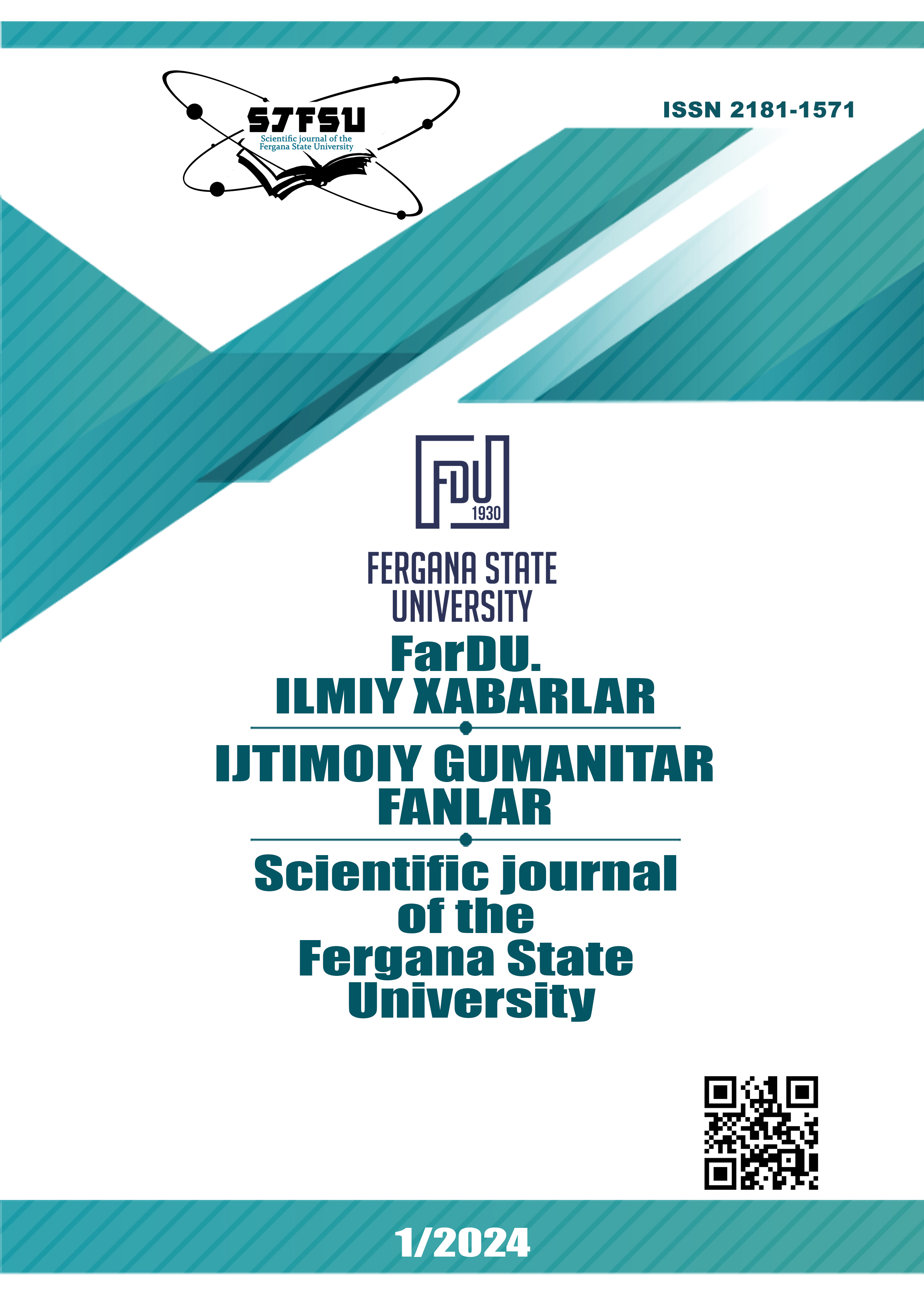ASKIA-THE ART OF WORDS, PRESENT RESPONSIBILITY AND INTELLIGENCE ASKIA-THE ART OF WORDS, PRESENT RESPONSIBILITY AND INTELLIGENCE
Main Article Content
Abstract
The inclusion of Uzbek askiya, which is an independent genre in world folklore, into the list of rare objects by the international UNESCO organization, the study of the genre nature, classification, artistic aesthetic essence of Uzbek askiya based on new modern concepts of folklore, and monographic research are one of the important tasks of folklore studies. It is necessary to specify the expression of the national spirit in the Askiya genre, the vital and domestic functions of folklore genres, and the place of Askiya in the development of the scope of artistic and aesthetic tasks. This determines the relevance of this research topic. Askiya, as an independent genre of Uzbek folklore, was first studied by ethnographers at the beginning of the 20th century. In this regard, the services of A.L. Troitskaya are of particular importance. Based on his observations about the Uzbeks and field notes, the scientist expresses his opinions about the performance of askiya among the people by amateurs since ancient times, and some of its types.
The article talks about the fact that the askiya is based on humor, is built on the basis of humor, and causes laughter to come to the field in order to test the skill, accuracy, responsiveness, and sharpness of the thinking of the performers of the topic in the askiya. The role of Askiya in the development of our spiritual life and the artistic thinking of our people, the peculiarities of the art of Askiya texts, the performance style and skills of Askiya performers have been revealed.
As a genre of folklore, it is a dialogic or polylogical speech based on a competition performed by two or more people side-by-side, and in its essence, humor leads. It is a unique oral literary work created by a community that passes from mouth to mouth, from generation to generation.
Askiya is important as an independent genre of Uzbek folklore in accordance with the theory of humor due to its nature: it is based on humor, it is built on the basis of humor, it causes laughter, the use of words and phrases with metaphorical content within a certain topic, it is formed on the basis of dialogic speech, and it acquires a binary essence.
Askiya has not been studied independently in the philology of the world and Turkic peoples, it has only been studied since the second half of the 20th century as an example of oral art. In this regard, the candidate's thesis of the Uzbek folklorist R. Muhamadiyev is particularly noteworthy. By the 21st century, the linguistic aspects of Askiya were researched by the Uzbek linguist Kh.Kh.Dosmatov.
Askiya is a genre specific to the dramatic genre. Askiya is characterized by the fact that it is intended for stage performance, representing the unique aspects of folk drama. In Askia, the participants act as stage characters and their dialogic speech is evaluated by the audience. This very aspect of the matter determines the species affiliation of this genre.
Article Details

This work is licensed under a Creative Commons Attribution-NonCommercial-NoDerivatives 4.0 International License.
References
O‘zbekiston Respublikasi Prezidentining 11.07.2023 yildagi PQ-222-sonli “Respublikada milliy askiya va qiziqchilik san’atini yanada rivojlantirish chora-tadbirlari to‘g‘risida” qarori https://lex.uz/docs/-6531520
Andijon davlat universiteti folklor arxivi. Folklor ekspeditsiyasi materiallari. 47-daftar.
Do‘smatov X.X. Askiya matnining lingvostilistikasi. Filol.fan.b. fals. dokt... diss. ‒ Farg‘ona, 2018. ‒ 135 b.
Elxan Nəcəfovun. Ədəbiyyat nəzəriyyəsi. Boku,“HƏDƏF”// Vikipediya, azad ensiklopediya
Imomov K., Mirzayev T., Safarov O. va Sarimsoqov B. Askiya. O‘zbek xalq og‘zaki poetik ijodi. Darslik. ‒ Toshkent: O‘qituvchi, 1990. ‒ 340 b.
Jo‘rayev M., Eshonqulov J. Folklorshunoslikka kirish. – Toshkent: Barkamol fayz media nashriyoti, 2017. ‒ 180 b.
Joʻrayev M., Eshonqulov J. Folklorshunoslikka kirish. – Toshkent: Barkamol fayz media nashriyoti, 2017. ‒ B.103.
Madayev O., Sobitova T. O‘zbek xalq og‘zaki poetik ijodi. ‒ Toshkent: Sharq, 2005. ‒ 208 s.
Mirzayeva S., Xolbutayev G‘. Farg‘ona vodiysi askiya san’ati ‒ Andijon: Arjumand media, 2019. ‒ 144 b.
Muhamadiyev R. Askiya (oʻzbek xalq ijodiyotining janri). Filol.fan.nom.diss. – Toshkent, 1961. ‒ 233 b.
Muxammadiyev R. (to‘plovchi va nashrga tayyorlovchi) O‘zbek xalq og‘zaki ijodi. Askiya. – Toshkent: G‘afur G‘ulom nomidagi adabiyot va san’at nashriyoti, 1970. ‒ 288 b.
Qodirov M. Masxaraboz va qiziqchilar san’ati. – Toshkent: Fan, 1971. – 244 b.
Qodirov M. O‘zbek an’anaviy teatri. ‒ Toshkent: Alisher Navoiy nomidagi O‘zbekiston Milliy kutubxonasi nashriyoti, 2010. ‒ 248 b.
Qodirov M. Oʻzbek xalq tomosha sanʼati. ‒ Toshkent, Oʻqituvchi, 1981. ‒105 b.
Sultonov H. Askiya. Kulgi chehraning guli. – Toshkent: Cho‘lpon, 1998. –185 b.
Алексеев В.Л. Оружием политической сатиры. ‒ М.: Мысль, 1979. ‒ 244 с.
Бахтин М.М. Литературно-критические статьи. монография, сборник работ. ‒ М.: Художественная литература, 1986. ‒ С.3. (общ. С.543)
Бахтин М.М. Творчество Франсуа Рабле и народная культура средневековья и Ренессанса. ‒ М.: Художественная литература, 1990. ‒ 543 с.
Веселовский А.Н. Историческая поэтика. ‒ М.: Высшая школа, 1989. ‒ 404 с.
Дмитриев A.B. Социология юмора. ‒ М., 1996. ‒ 214 с. Лук А.Н. Юмор, остроумие, творчество. ‒ М.: Искусство, 1977. ‒ 184 с.
Карасев Л.В. Философия смеха. ‒ М.: Рос. гуманит. ун-т, 1996. ‒ 224 с.
Лук А.Н. О чувстве юмора и остроумии. ‒ М.: Искусство, 1966. ‒ С. 31-32.
Материал wortwuchs.net сайтидан олинди.
Мухтар Казымоглы. Генезис и поэтика смеха в азербайджанском фольклоре. – Баку: Элм ве техсил, 2017. – 360 с.
Пропп В.Я. Проблемы комизма и смеха. – М.: Искусство, 1976. ‒ 183 с.
Троицкая А.Л. Народный театр в Узбекистане // Восточный сборник. 1990. Вып. № 4. – С. 144-151.
Чернявский М.Н. Комедия Аристофана и античные теории смеха // Аристофан. ‒ М., 1956. – С. 81-108

